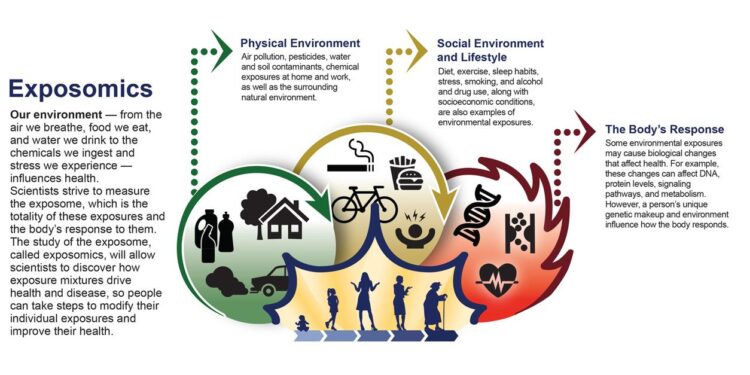Exploring Exposomics: A New Paradigm in Biomedical Research
The dynamic realm of biomedical research is witnessing a significant evolution with the advent of exposomics, a field that merges environmental science with human health. As scientists gain deeper insights into how environmental factors influence health outcomes, the incorporation of exposomics into biomedicine is set to transform our comprehension of disease mechanisms and preventive measures. This innovative approach aims to chart the intricate network of chemical exposures—from pollutants in the air to components in our diets—that individuals face throughout their lives. By leveraging cutting-edge technologies and fostering interdisciplinary collaboration, researchers are uncovering connections between these exposures and various health issues while paving the way for personalized medicine that reflects individual environmental experiences. In this article, we will explore recent advancements and challenges associated with integrating exposomics into biomedicine, highlighting its potential impact on future healthcare.
The Role of Exposomics in Advancing Biomedical Science
The incorporation of exposomics within biomedicine signifies a revolutionary shift towards comprehending how environmental factors affect human well-being. This emerging field seeks to identify and quantify an array of environmental influences—spanning from air quality issues to dietary choices—that individuals encounter over their lifetimes. Utilizing sophisticated analytical methods alongside big data analytics enables researchers to delineate complex relationships between these exposures and health outcomes, thus facilitating more tailored preventive healthcare strategies. As this scientific discipline progresses, it opens new pathways for targeted interventions aimed at alleviating harmful exposure effects on public health.
Recent investigations underscore the necessity for integrating exposomic principles within clinical environments. Notable findings include:
- Creation of extensive databases that amalgamate exposure information with genomic and proteomic data, forming a comprehensive view of individual health.
- Application of machine learning techniques to scrutinize intricate datasets and reveal previously hidden patterns.
- Aiding public health policies by providing robust scientific evidence supporting regulations related to environmental risks.
This multidisciplinary approach holds promise not only for enhancing personal health outcomes but also for reshaping public health initiatives by making them more attuned to the interplay between genetics and environment. The integration of exposomic data will be essential as biomedicine evolves in addressing contemporary health challenges.
Connecting Environmental Factors to Health Issues
The relationship between environmental influences and disease outcomes is becoming increasingly evident as researchers delve deeper into exposomics studies. By systematically gathering data on various chemicals and pollutants encountered daily by humans, scientists aim to clarify their direct effects on disease development processes. This growing discipline facilitates comprehensive dataset integration that reveals how specific environmental exposures—ranging from atmospheric conditions to food contaminants—can either promote or hinder disease progression within our bodies.
Recent research employing advanced high-throughput metabolic profiling technologies has uncovered critical correlations linking exposure levels with conditions such as asthma, cancer, and neurological disorders. The implications are vast; they include opportunities for developing personalized healthcare interventions based on unique exposure profiles derived from individuals’ environments:
- Aerosol pollutants: Linked with worsening respiratory illnesses.
- Toxic metals: Associated with cognitive decline among urban residents.
- Agricultural chemicals (Pesticides): Connected with increased rates of endocrine-related diseases.
| Type Of Environmental Exposure | Related Health Condition | ||||
|---|---|---|---|---|---|
| Air Quality Deterioration | Respiratory Disorders | ||||
| Heavy Metal Contamination | < <Neurological Impairments | < ||||
| Pesticide Residues |
| Research Focus Area | Anticipated Outcomes | ||||
|---|---|---|---|---|---|
| Chemical Exposure Evaluation | < | Bacterial Flora Influence | < | Tailored Medical Approaches |
Conclusion Section < / h2 >
The fusion between expo-somatics & biomedical sciences marks an unprecedented advancement regarding comprehending complexities surrounding wellness/disease dynamics.< br/>As scholars persistently unravel intricacies tied together via external stimuli influencing biological systems; prospects emerge offering innovative preventative/treatment methodologies expanding horizons further than ever before!< br/>Commitment exhibited bridging gaps existing today linking collected information pertaining directly back onto tangible results seen improving overall quality life experienced globally!< br/>With increasing investments coupled collaborations spanning multiple fields – role played out here becomes crucial tackling pressing matters facing society today! Looking forward ahead possibilities arising through this burgeoning sector appear promising indeed heralding transformative era reshaping traditional paradigms governing patient care/prevention strategies alike!










